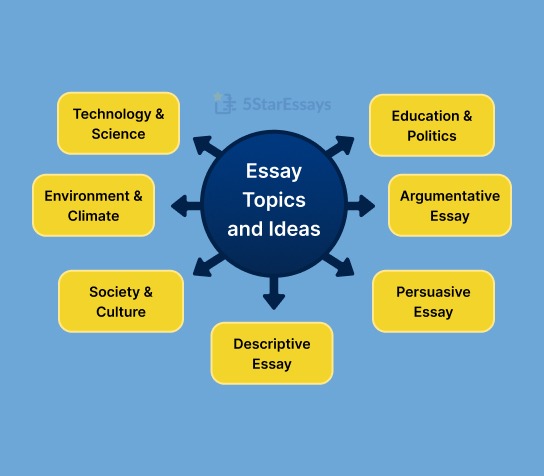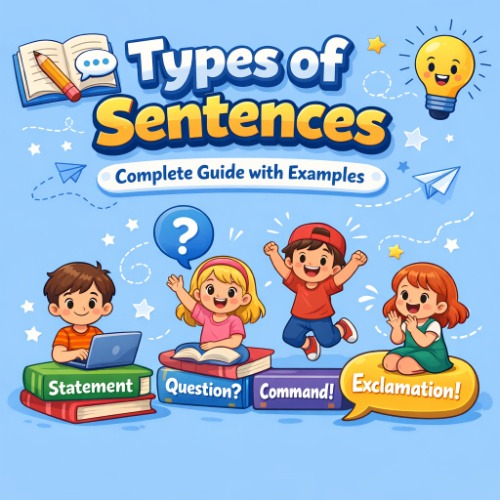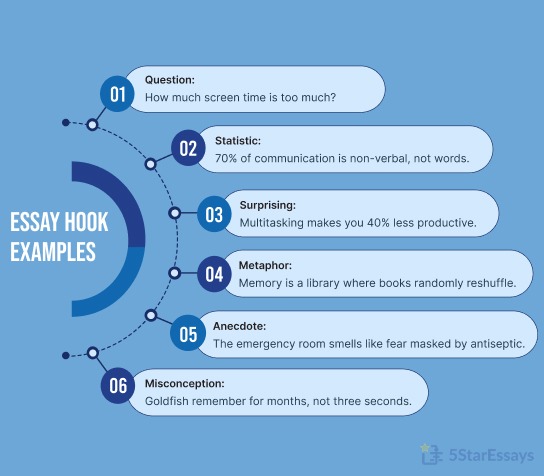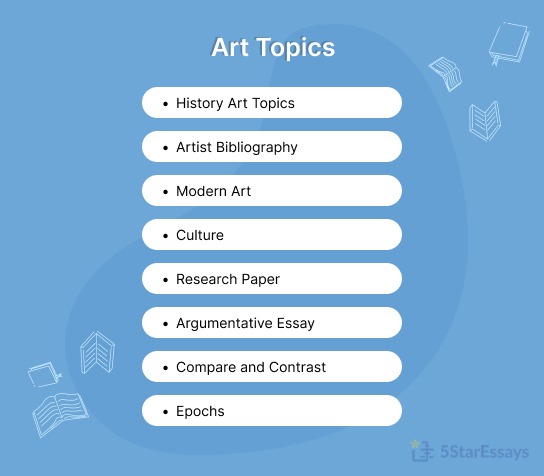Understanding Thesis Statement?
A thesis statement is a one to two sentence declaration that presents your essay's main argument, takes a clear position on your topic, and previews the reasoning or evidence you'll use to support that position. It is the backbone of any academic paper or essay. Think of it as a contract with your reader: "If you invest time reading my essay, here's exactly what I'll prove and why it matters."
Struggling to Write a Strong Thesis Statement?
Get expert help to create a clear, powerful foundation for your essay.
- Expert crafted thesis statements tailored to your topic
- Clear, arguable claims that meet academic standards
- Guidance aligned with your assignment requirements
- Improved essay structure and overall coherence
Build a strong essay from the start with a professionally written thesis statement.
Order NowWhat makes a thesis statement strong vs weak
Understanding the difference between effective and ineffective thesis statements is the first step toward writing better ones.
Strong thesis statements share three qualities:
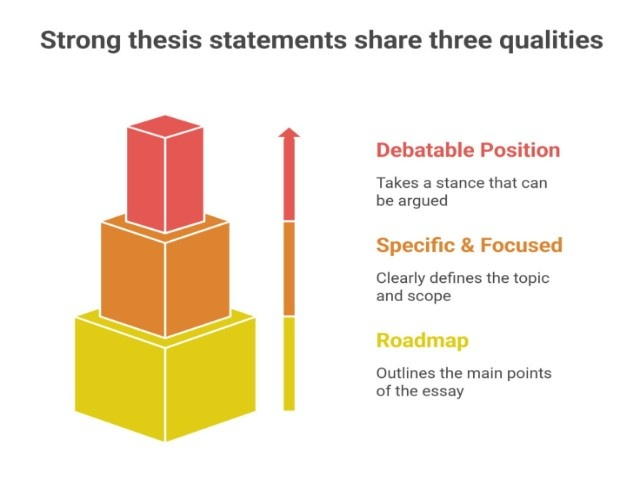
1. They take debatable positions. If everyone already agrees with your claim, you're stating a fact, not making an argument. "Shakespeare wrote many famous plays" isn't a thesis because no one would disagree. "Shakespeare's comedies reveal more about Elizabethan social anxieties than his tragedies" is debatable and worth proving.
2. They're specific and focused. Vague claims like "Social media affects teenagers" tell readers nothing meaningful. Specific claims like "Social media algorithms exploit teenage insecurities to maximize engagement, contributing to rising adolescent anxiety rates" give readers a clear argument to evaluate.
3. They provide a roadmap. Your thesis should preview what your essay will cover, giving readers clear expectations. "Universal basic income should be implemented because it reduces poverty more efficiently than means-tested programs, stimulates economic growth, and addresses technological unemployment," tells readers exactly what three body paragraphs will discuss.
Weak thesis statements share predictable flaws:
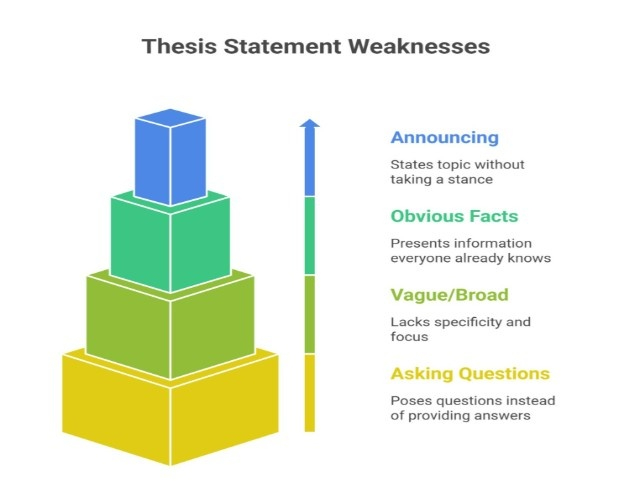
1. They announce instead of arguing. "This essay will discuss the causes of climate change," announces a topic without taking any position on it. Make a claim instead: "Human industrial activity, not natural climate cycles, drives contemporary global warming."
2. They state obvious facts. "Pollution is bad for the environment" offers nothing to prove. Everyone knows this. Thesis statements must present claims that intelligent people might disagree with.
3. They're too vague or broad. "Technology impacts society in many ways" is so broad that it could apply to thousands of different essays. Narrow your focus: "Smartphone addiction has fundamentally altered how Millennials and Gen Z form and maintain romantic relationships."
4. They ask questions instead of answering them. "Should schools ban smartphones?" is the question your essay should answer, not your thesis. Transform questions into answers: "Schools should ban smartphones during class because they reduce attention spans, facilitate academic dishonesty, and diminish face to face social skills."
The Proven Formula for Writing Strong Thesis Statements
While thesis statements vary by essay type, this universal formula works across contexts:
[Specific topic] + [Debatable claim] + [Reasons/Evidence preview]
Let's break this down with examples:
Topic: Universal basic income
Claim: Should be implemented
Reasons: Reduces poverty efficiently, stimulates the economy, addresses automation unemployment.
Thesis: "Universal basic income should be implemented because it reduces poverty more efficiently than means-tested programs, stimulates economic growth through increased consumer spending, and addresses technological unemployment that will accelerate over the next decade."
Topic: Shakespeare's Hamlet
Claim: Hamlet's madness is a strategic performance, not genuine breakdown
Reasons: Self-aware commentary, selective application, achieves political goals
Thesis: "Hamlet's feigned madness serves as a calculated political strategy rather than genuine psychological breakdown, as evidenced by his self-aware commentary on performance, his selective application of 'madness' only when politically useful, and his ultimate success in exposing Claudius's guilt."
| This formula ensures your thesis takes a position (claim), names what you're discussing (topic), and tells readers what evidence to expect (reasons). |
Characteristics of a Thesis Statement
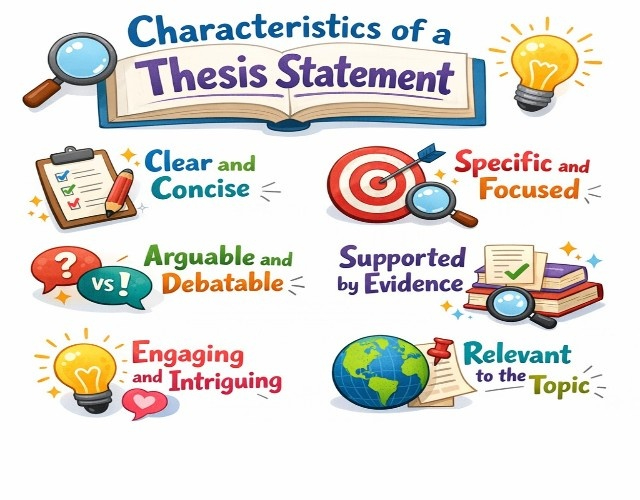
A thesis statement possesses several key characteristics that make it effective and impactful.
Understanding these characteristics is essential for crafting a strong and compelling thesis statement.
Here are the key characteristics to consider:
- Clear and Concise: A good thesis statement is clear, presenting the main argument or point straightforwardly. It avoids vague or ambiguous language, ensuring that the reader understands the central idea without confusion.
- Specific and Focused: A thesis statement is specific, addressing a particular aspect or angle of the topic. It avoids broad or general statements, honing in on a well-defined argument or position.
- Arguable and Debatable: A strong thesis statement presents an argument or claim that can be debated or challenged. It goes beyond stating a mere fact and instead takes a stance that can be supported with evidence and analysis.
- Supported by Evidence: A thesis statement is supported by evidence, which may include examples, statistics, research findings, or logical reasoning. It provides a clear link between the main argument and the supporting evidence that will be presented in the paper.
- Engaging and Intriguing: An effective thesis statement grabs the reader's attention and sparks curiosity. It presents an interesting and thought-provoking perspective, enticing the reader to continue reading.
- Relevant to the Topic: A thesis statement is directly related to the topic or subject matter of the paper. It ensures that the main argument is pertinent and contributes to the overall understanding of the topic.
Writing an Effective Thesis Statement
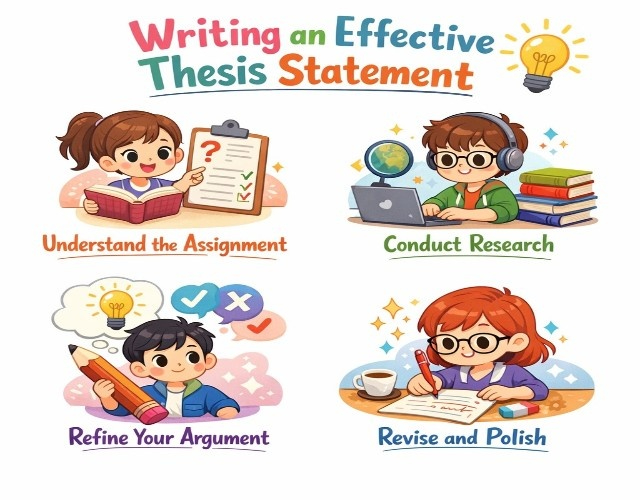
Writing a strong thesis statement requires a thoughtful and strategic approach. Follow these steps to create an effective thesis statement:
Understand the Assignment
Carefully read and analyze the assignment prompt or guidelines. Identify the key requirements, such as the topic, purpose, and specific instructions for the thesis statement.
Example:
Assignment Prompt: "Discuss the impact of social media on modern relationships." Key Requirements: Analyze the impact of social media on relationships. |
Conduct Research
Gather relevant information and conduct research on the topic.
Explore different perspectives, arguments, and evidence related to your subject matter. This will help you develop a well-informed and comprehensive thesis statement.
Identify the Main Argument
Determine the main argument or position you want to present in your paper. Consider the specific angle or perspective you wish to take on the topic.
Example:
| Main Argument: "Social media has significantly altered the dynamics of modern relationships, leading to both positive and negative consequences." |
Refine Your Argument
Evaluate the ideas generated during brainstorming. Select the strongest and most compelling argument that aligns with your research and purpose.
Ensure your argument is specific, focused, and debatable.
Example:
| "Social media's influence on relationships is a complex interplay of enhanced communication, privacy concerns, and emotional challenges." |
Revise and Polish
Review your thesis statement and refine it if necessary.
Consider feedback from professors, peers, or writing tutors to improve its clarity and effectiveness.
Ensure that your thesis statement accurately represents the content and direction of your paper.
20+ Thesis Statement Examples Across Essay Types
Learning from examples helps you understand how principles translate to practice. Here are strong thesis statements for different essay types:
Argumentative essay thesis statements
Argumentative theses take clear positions on controversial topics and preview the reasoning that supports those positions.
1. "College athletes should receive financial compensation beyond scholarships because universities profit directly from their athletic performance, current NCAA regulations exploit student labor, and compensation would reduce illegal recruiting violations."
2. "The voting age should be lowered to 16 because teenage workers pay taxes without representation, 16 year olds demonstrate cognitive capacity for informed political decisions, and early voting participation creates lifelong civic engagement habits."
3. "Implementing universal healthcare would improve American health outcomes while reducing overall healthcare costs through preventive care incentives, administrative efficiency, and collective bargaining power."
| Need to learn more about an argumentative essay? Explore our argumentative essay guide. |
Analytical essay thesis statements
Analytical theses make interpretive claims about texts, artworks, or phenomena, previewing what aspects your analysis will examine.
1. "Fitzgerald uses weather imagery throughout The Great Gatsby not merely as backdrop but as active force mirroring Gatsby's emotional arc and foreshadowing his tragic end, suggesting that the American Dream itself is environmentally determined rather than self-willed."
2. "Instagram's interface design exploits psychological vulnerabilities through infinite scroll mechanisms, strategic notification timing, and social comparison metrics that collectively maximize user engagement regardless of wellbeing impacts."
3. "The progression from Impressionism to Cubism reflects deeper shifts in how Western society understood visual perception, moving from capturing subjective experience to deconstructing the very act of seeing itself."
| Interested in learning more about an analytical essay? Visit our analytical essay guide. |
Expository essay thesis statements
Expository theses inform or explain without taking controversial positions, but still make specific claims about what readers will learn.
1. "Understanding photosynthesis requires examining three interconnected processes: light absorption in chloroplasts, conversion of light energy to chemical energy, and synthesis of glucose from carbon dioxide and water."
2. "Successful college transitions depend on developing time management skills, building social support networks, and establishing academic self-advocacy behaviors during the first semester."
3. "The scientific method involves systematic steps, observation, hypothesis formation, experimentation, data analysis, and conclusion, that distinguish scientific inquiry from other knowledge-generating approaches."
| Want to know more? Check our expository essay guide. |
Compare and contrast thesis statements
Compare and contrast theses, identify meaningful similarities or differences, and explain their significance.
1. "While both meditation and medication address anxiety symptoms, meditation targets root causes through neurological changes while medication provides symptomatic relief, making meditation more effective for long-term anxiety management despite medication's faster initial results."
2. "Online education and traditional classroom learning differ fundamentally in social interaction opportunities, schedule flexibility, and self-discipline requirements, with each modality serving different student needs and learning preferences rather than one being universally superior."
| Explore our compare and contrast essay guide to understand how a well-written thesis statement strengthens your entire essay. |
Cause and effect thesis statements
Cause and effect theses establish relationships between actions and outcomes, often predicting consequences.
1. "The shift to remote work will permanently transform urban geography by reducing demand for commercial office space, enabling population redistribution away from expensive coastal cities, and fundamentally altering commute-driven infrastructure planning."
2. "Social media algorithms that prioritize engagement over accuracy have accelerated political polarization by creating filter bubbles, amplifying extreme content, and rewarding inflammatory rhetoric more than nuanced discourse."
| Pro Tip: Explore our cause and effect essay guide to learn how to write a clear thesis that explains relationships between events and outcoes |
Personal essay thesis statements
Personal essay theses connect individual experiences to broader insights or universal themes.
1. "My grandmother's kitchen taught me that economic value and human value operate on different scales, a lesson that shaped my approach to business ethics more than any economics course ever could."
2. "Failing my first college exam forced me to distinguish between studying as performance and learning as process, a distinction that proved more valuable than any individual grade."
| If you're applying to college or graduate school, explore our personal statement guide to learn how to craft a clear and compelling central message |
Struggling to Write a Strong Thesis Statement?
Get expert help to create a clear, powerful foundation for your essay.
- Expert crafted thesis statements tailored to your topic
- Clear, arguable claims that meet academic standards
- Guidance aligned with your assignment requirements
- Improved essay structure and overall coherence
Build a strong essay from the start with a professionally written thesis statement.
Order NowWhere to Place Your Thesis Statement
In most academic essays, place your thesis at the end of your introductory paragraph, typically as the last or second to last sentence. This placement works because it allows you to:
1. Provide the necessary context first. Readers need background information before they can understand your argument's significance. Your introduction should move from the general context to your specific thesis.
2. Hook readers before making demands. Starting with your thesis feels abrupt. Opening with an attention-grabbing hook, providing context, and then presenting your thesis creates natural flow.
3. Create satisfying structure. Ending your introduction with your thesis creates a clear transition to body paragraphs, each of which develops one reason from your thesis.
4. For very short essays (500 words or less): You might place the thesis earlier, even as the second or third sentence, because you have limited space for an introduction.
5. For longer research papers (3,000+ words): Your thesis might appear after a more extensive background, but still within the first 10% of your paper.
What comes before your thesis in the introduction:
| Start with a hook, question, statistic, quote, anecdote, or surprising statement that grabs attention. Provide 2 to 4 sentences of background context that establish why your topic matters and what readers need to know to understand your thesis. Then present your thesis as the natural culmination of this setup. |
Thesis Statements for Different Essay Lengths
Adjust your thesis complexity to match essay length:
1. For 500 word essays: One sentence thesis with one main claim and 2-3 brief supporting points. Focus on clarity and directness; you don't have space for complex qualifiers.
"School uniforms should be mandatory because they reduce socioeconomic appearance competition, eliminate dress code enforcement inconsistencies, and improve student focus on academics rather than fashion."
2. For 1,000 to 1,500 word essays: One to two sentence thesis with a main claim and 3 to 4 developed supporting points. You can include brief qualifiers or acknowledge complexity.
"While school uniforms limit personal expression, they should be mandatory in public schools because they demonstrably reduce socioeconomic tensions related to clothing costs, eliminate the administrative burden and legal challenges of enforcing dress codes, and refocus student attention on academic rather than social competition."
For 2,000+ word research papers: Two-sentence thesis that states your position and provides nuanced reasoning. You can acknowledge counterarguments and explain scope limitations.
"Universal basic income should be implemented, but only if funded through progressive taxation rather than deficit spending. Cash transfers would reduce poverty more efficiently than means tested programs while stimulating economic growth through increased consumer spending, though implementation requires addressing concerns about work incentives through program design that preserves employment benefits."
Common thesis statement mistakes (and how to fix them)
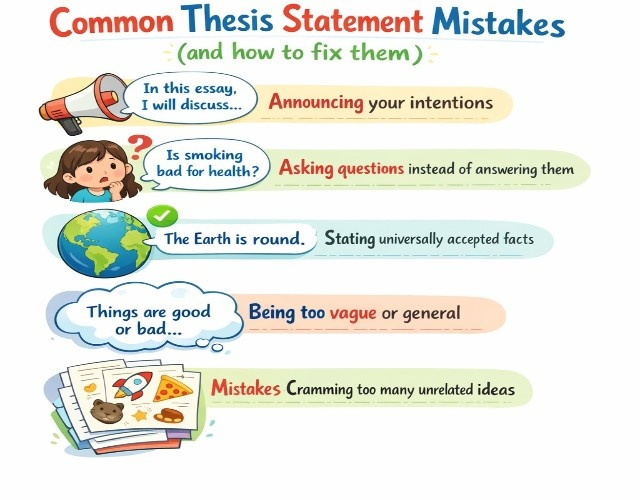
Even strong writers fall into these patterns:
Mistake #1: Announcing your intentions
- Wrong: "In this essay, I will discuss the effects of deforestation on climate change."
- Why it's wrong: Never announce what you'll do. Just do it.
- Fixed: "Tropical deforestation accounts for 15% of global carbon emissions, more than all cars, trucks, and planes combined, making rainforest preservation as critical to climate mitigation as transitioning to renewable energy."
Mistake #2: Asking questions instead of answering them
- Wrong: "What are the benefits of renewable energy?"
- Why it's wrong: Your thesis should answer questions, not ask them.
- Fixed: "Transitioning to renewable energy would reduce carbon emissions, create more jobs than fossil fuel industries currently provide, and decrease consumer energy costs within a decade, making infrastructure investment economically rational even without considering environmental benefits."
Mistake #3: Stating universally accepted facts
- Wrong: "Shakespeare was an important writer who wrote many famous plays."
- Why it's wrong: If no one disagrees, it's not a thesis, it's a fact.
- Fixed: "Shakespeare's history plays reveal more about Elizabethan political anxieties than actual historical events, functioning as commentary on contemporary power struggles disguised as historical drama."
Mistake #4: Being too vague or general
- Wrong: "Social media has both positive and negative effects on teenagers."
- Why it's wrong: This could apply to literally anything. It takes no real position.
- Fixed: "While social media facilitates peer connection and information access, its algorithmic design exploits adolescent insecurities through comparison metrics and engagement manipulation, creating net negative mental health effects that outweigh connectivity benefits."
Mistake #5: Cramming too many unrelated ideas
- Wrong: "Social media affects mental health, changes communication, influences elections, and creates new business opportunities, while also raising privacy concerns and regulatory questions."
- Why it's wrong: This is six different essays, not one focused argument.
- Fixed: Focus on one claim with 2 to 3 related supporting reasons.
Most students write their thesis before fully understanding their argument. That's backward. Draft your body paragraphs first, then write your thesis based on what you actually argued. Many professional writers discover their real thesis only after completing a full draft. Our professional essay writing service shows you how to refine thesis statements during revision to perfectly match the arguments you've developed.
How to Revise Weak Thesis Statements
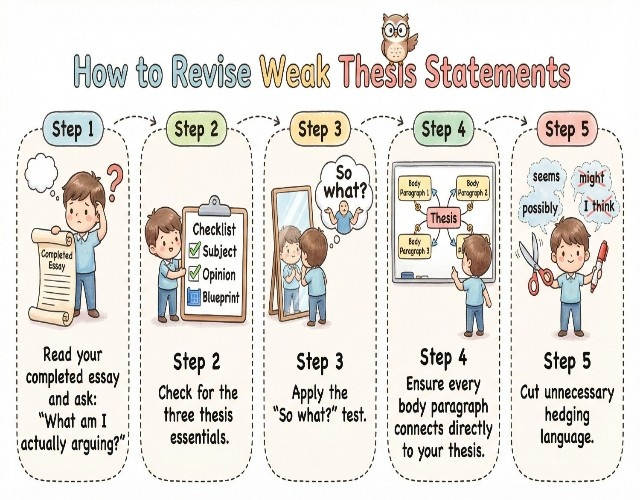
Your first draft thesis rarely matches your best argument. Here's how to strengthen it:
Step 1: Read your completed essay and ask: "What am I actually arguing?"
Often you discover your real argument in your conclusion or final body paragraph, not your introduction. If your conclusion says something more sophisticated than your thesis, that's your real thesis.
Step 2: Check for the three thesis essentials
Does your thesis take a debatable position? (Not just stating facts?) Is your thesis specific and focused? (Not vague claims that could apply to any essay?) Does your thesis preview your reasoning? (Not just stating a position without supporting logic?)
If you answer "no" to any question, revise accordingly.
Step 3: Apply the "So what?" test
After reading your thesis, ask "So what? Why should readers care?" If you can't answer clearly, your thesis lacks significance. Add language explaining stakes or implications.
Weak: "Remote work increases productivity." After "So what?" test: "Remote work increases productivity by 13% according to Stanford research, suggesting companies resisting flexible arrangements sacrifice competitive advantages to outdated office-centrism."
Step 4: Ensure every body paragraph connects directly to your thesis
Read your thesis, then read only your topic sentences. Each topic sentence should develop one specific claim or reason mentioned in your thesis. If a body paragraph doesn't connect to your thesis, either revise the paragraph or revise your thesis.
Step 5: Cut unnecessary hedging language
Academic writing values precision, but excessive hedging weakens your authority.
- Weak: "It seems like social media might possibly have some negative effects that could potentially impact teenage mental health in various ways."
- Strong: "Social media algorithms exploit teenage insecurities to maximize engagement, contributing to rising adolescent anxiety rates."
You can acknowledge complexity without undermining your argument entirely.
Final thoughts on thesis statement mastery
Here's what matters most: your thesis statement isn't just an arbitrary requirement professors impose. It's the foundation that determines whether your entire essay succeeds or fails. Strong thesis statements make writing easier because they give you a clear roadmap to follow. Weak thesis statements guarantee struggle because you're writing without direction.
The difference between B essays and A essays often comes down to thesis statements. B essays have adequate theses that state positions without much depth. A essays have sophisticated theses that take clear, specific, debatable positions while previewing compelling reasoning.
Think of your thesis statement as a contract with your reader: "If you invest time reading my essay, here's exactly what argument I'll prove and why it matters." When you honor that contract with specific claims, clear reasoning, and focused evidence, readers, including your professors, reward you with higher grades and genuine engagement with your ideas.
Master the formula: [Specific topic] + [Debatable claim] + [Reasons/Evidence preview]. Apply it to your essay type. Revise it after drafting to match your actual argument. And never settle for vague, announcer-style thesis statements when you can make bold, specific, defensible claims instead.
Want to improve your essay writing skills? Explore our complete essay writing guide for expert tips, examples, and step by step instructions
Remember! Your thesis statement is the single most important sentence you'll write. Make it count.
Make Your Thesis Statement Stand Out
Professional essay writing service helps you craft clear and compelling arguments.
- Original, plagiarism free thesis statements
- Strong positioning that improves your essay grade
- Alignment with academic guidelines and rubrics
- Fast, reliable help when you're short on time
Get a thesis statement that sets your essay up for academic success.
Order Now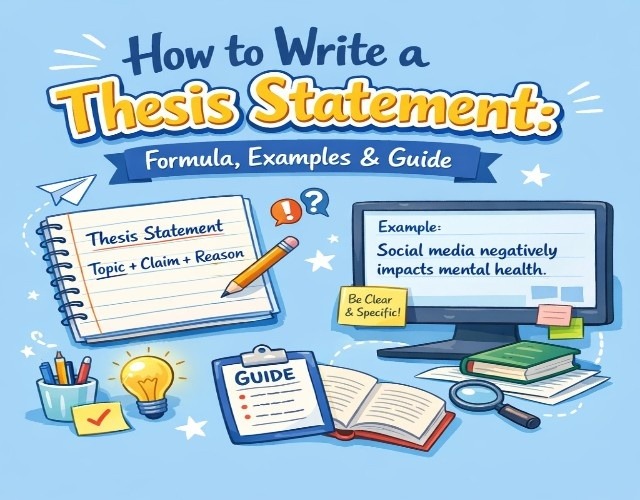





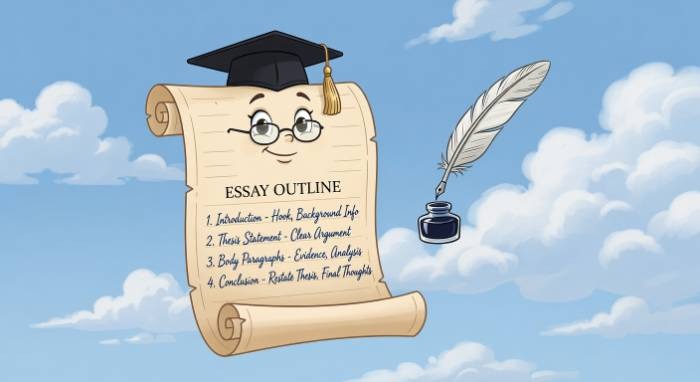

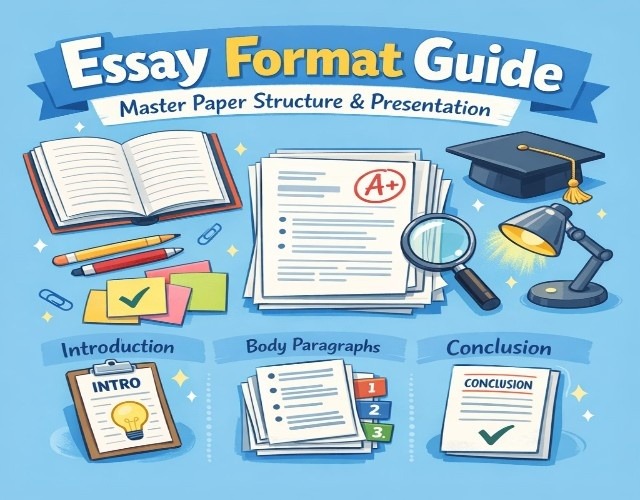
-20154.jpg)
